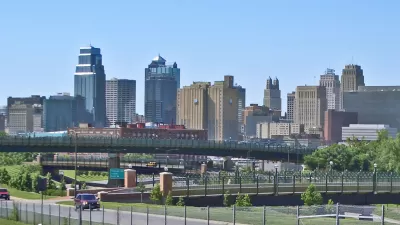Kansas City, Missouri, wants to be a smart cities leader, but it also needs to address concerns about data collection and privacy, say critics.

Kansas City is positioning itself at the forefront of the smart cities landscape by encouraging private companies to try out new projects and by seeking out federal funding for programs.
In 2011, it was the first city to get Google Fiber, and Cisco Systems came in a couple years later and installed fiber optic cable and traffic monitors along a new streetcar route. "The city’s downtown corridor now monitors nearly everything that happens along this stretch of road — cars, pedestrians and parking spaces. The wireless system has been used by 2.7 million people," reports Timothy Williams.
As Kansas City and other cities across the country scramble to get out ahead of the technology game, experts say they need to think more about privacy, security, and financial issues, particularly as they relate to agreements made with private companies. "Some mayors acknowledge that they have yet to master the responsibilities that go along with collecting billions of bits of data from residents," adds Williams.
Kansas City is now looking to expand services to the East Side, a low-income area where the majority of homes do not have internet access. "The city says it wants to transform the neighborhood, which has a high crime rate and is dotted with vacant buildings. It plans to install air quality sensors, water meters to detect leaks, a bus line, surveillance cameras and a gunshot detection system," notes Williams.
Some residents say they welcome the improvements the new technology will bring. But others worry about surveillance in communities of colors and the consequences of handing over access to private technology companies.
FULL STORY: In High-Tech Cities, No More Potholes, but What About Privacy?

Alabama: Trump Terminates Settlements for Black Communities Harmed By Raw Sewage
Trump deemed the landmark civil rights agreement “illegal DEI and environmental justice policy.”

Study: Maui’s Plan to Convert Vacation Rentals to Long-Term Housing Could Cause Nearly $1 Billion Economic Loss
The plan would reduce visitor accommodation by 25% resulting in 1,900 jobs lost.

Planetizen Federal Action Tracker
A weekly monitor of how Trump’s orders and actions are impacting planners and planning in America.

Wind Energy on the Rise Despite Federal Policy Reversal
The Trump administration is revoking federal support for renewable energy, but demand for new projects continues unabated.

Passengers Flock to Caltrain After Electrification
The new electric trains are running faster and more reliably, leading to strong ridership growth on the Bay Area rail system.

Texas Churches Rally Behind ‘Yes in God’s Back Yard’ Legislation
Religious leaders want the state to reduce zoning regulations to streamline leasing church-owned land to housing developers.
Urban Design for Planners 1: Software Tools
This six-course series explores essential urban design concepts using open source software and equips planners with the tools they need to participate fully in the urban design process.
Planning for Universal Design
Learn the tools for implementing Universal Design in planning regulations.
Caltrans
Smith Gee Studio
Institute for Housing and Urban Development Studies (IHS)
City of Grandview
Harvard GSD Executive Education
Toledo-Lucas County Plan Commissions
Salt Lake City
NYU Wagner Graduate School of Public Service





























